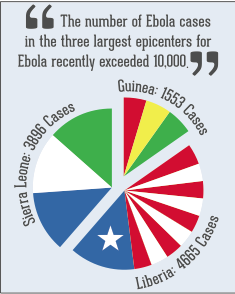Kaci Hitchcox, a Doctors Without Borders nurse who returned to the states after working with Ebola patients, announced Wednesday that because she has shown no symptoms of the disease, she does not intend to agree to the 21-day quarantine imposed upon her by authorities.
According to an article on www.usatoday.com, Hitchcox believes her constitutional rights are being abused in a way that is not based on any scientific evidence.
While some Americans are worried about the spread of ebola in the U.S., sophomore Riley George, who is studying abroad in Zambia, said both Zambian locals and the students in the HIZ program still feel safe because Africa is so massive.
“Granted, they aren’t taking it lightly and people are taking precautions, but most people don’t realize how huge Africa is,” George said. “If the epicenter of the Ebola outbreak is in Liberia, then I’m currently more than 3,000 miles away. That’s more than the distance between L.A. and Portland, to put it in U.S. perspectives.”
George said that in contrast to the panic many Americans are experiencing or promoting, Africans view the situation with cautious optimism.
“Nowhere in Zambia have I found a populous so up in arms and worried about catching Ebola as the U.S., who is currently twice the distance away from the outbreak,” George said. “No, people here aren’t unconcerned or callous, but they also know the likelihood of contamination is minimal, so they focus their attention on helping the sick around them.”
George said in his opinion, the U.S. should increase aid to the most highly affected countries in order to eradicate the virus at its source.
“In times like this, people need all of the help they can get,” George said. “Supplies are always appreciated, but manpower is more so.”
Harding students on American soil recently formulated their own plans of action for Ebola treatment for a Capstone nursing project. Dr. Susan Kehl, dean of the Carr College of Nursing, said her students learned about the proper measures to take when dealing with such a dangerous disease and then compiled all of their research into a document, which she distributed to the entire nursing department.
According to Kehl, the document includes information on Ebola, its spread in Africa, how healthcare personnel should evaluate potential patients and what personal protective equipment healthcare personnel should wear.
In spite of the alarm recent American Ebola cases have caused, Kehl said our nation is well equipped to contain and treat this disease.
“We are blessed as a nation with the resources and infrastructure to deal with the Ebola spread to our country,” Kehl said.
Kehl said that she too believes the most beneficial thing for America to do is send more help toward the source of the problem.
“I believe the World Health Organization, Christian and humanitarian groups are attempting to stop the spread of EVD with resources, medical expertise and evidence-basedpublic health strategies,” Kehl said. “One example isSamaritan’s Purse, a Christian international relief agency that (is)seeking to provide resources to those countries where EVD is raging.The scope of the problem issignificant, so more assistance is and will be needed. Ibelieve that we should respond to others in need. I have lived in Liberia, I know the situation is graveand the needs are great.”
